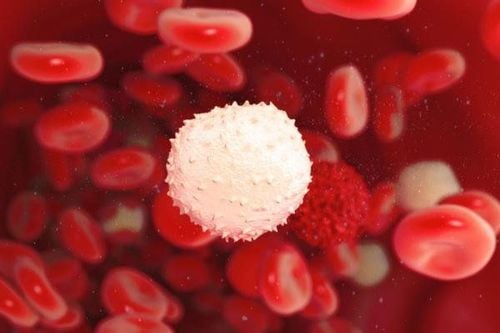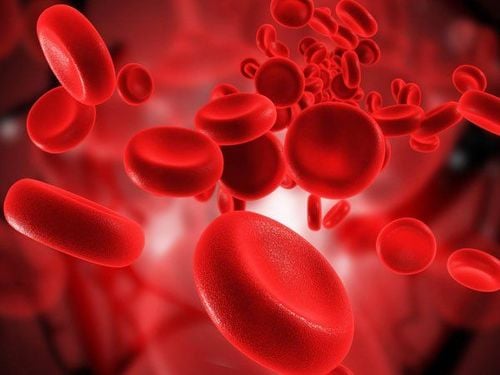This is an automatically translated article.
During pregnancy, your body makes more blood to support the growth of your unborn baby. If you do not eat enough nutrients, your body will not be able to make enough red blood cells needed to nourish the fetus. This is a symptom of anemia during pregnancy.1. When should a woman have a blood transfusion?
1.1 Anemia Since a pregnant woman's body needs to increase the production of blood and red blood cells to ensure the nutrition of the fetus, it means that the mother needs more iron. However, due to many different causes, mild to severe iron deficiency anemia in pregnant women is very common.
In severe cases, a woman may need a red blood cell transfusion to protect herself and her baby if the anemia is not improved by various ways such as iron supplements, folic acid, vitamin B12...
1.2 Bleeding Depending on the cause and extent of the bleeding, you may need transfusions of red blood cells, platelets, and plasma products. For example, ectopic pregnancy, postpartum hemorrhage, antepartum haemorrhage
1.3 Hemolytic disease of the newborn This is a phenomenon when the mother's body develops antibodies that attack the fetal red blood cells leading to anemia. Newborns receive blood transfusions to keep iron stores normal, and a blood exchange will remove the anti-D antibodies and the new red blood cells should be able to function as they should.
1.4 Immune platelet disorders These disorders occur when a maternal antiplatelet antibody crosses the placenta and works against the fetal platelets. Treatment of this disorder requires treatment with maternal immunoglobulin and special platelet transfusions until birth and during the first few days after birth.

Rối loạn tiểu cầu miễn dịch là lý do sản phụ cần phải truyền máu
2. How is a blood transfusion done?
Usually, blood transfusion products for pregnant and newborn women only include red blood cells, but in a small number of other cases, platelet and plasma transfusions are required depending on the cause of anemia during pregnancy. pregnant.
For a blood transfusion, the medical staff will place a small tube into a vein in your arm and the blood will flow from the blood bag through a dropper into the mother's body. Each blood bag holds about 1/3 liter of blood and takes about 3 hours to complete. In other cases, this transfusion rate can be adjusted to be faster or slower.
During the blood transfusion, the pregnant woman will be closely monitored by a medical team to be ready for emergency in case of a possible bad situation.
3. What are the side effects of blood transfusion during pregnancy?
Mild side effects include:
Headache Fever Rash/itching These side effects can be relieved with medication and will usually improve after a day.
More serious complications include:
Shortness of breath Severe headache A sudden drop in blood pressure that can be life-threatening When a serious side effect occurs, medical staff will immediately stop the transfusion and start Currently evaluating and emergency obstetrics. Severe side effects often occur in cases of pregnant women requiring large volumes of blood transfusions or repeated transfusions.
Other serious side effects, including:
Hypothermia Hyperkalemia leading to electrolyte imbalance Low blood calcium Blood clotting disorders Substance 2,3 – DPG (diphosphoglycerat) in red blood cells decreased Jaundice Infection Alloimmunization Blood Transfusion Reactions When these serious side effects occur, medical personnel will need to perform emergency intervention.
When the transfusion is complete, your doctor will recheck your hemoglobin level to make sure you've received enough blood and that most women don't need an extra transfusion. If a blood transfusion is given in an emergency, you will need to stay in the hospital afterwards and the length of your stay will depend on how well you recover.

Truyền máu khi mang thai có thể gây một số tác dụng phụ
4. Some notes to know about blood transfusion
If you are prescribed a blood transfusion, be sure that your doctor has provided all the information you need to make your own decision whether or not to have a transfusion. If you have any concerns about a blood transfusion, talk to your doctor or midwife. In the event of an emergency, you need a blood transfusion right away so your obstetrician will make decisions for you. You and your family members will be given full information when the crisis is over. You have the right to decide whether or not you want a blood transfusion, which may be for personal reasons or for religious beliefs. The doctor will advise carefully and respect your right to make decisions. Your doctor will then assist you with your pregnancy, labor, and delivery management plan. However, depending on the individual case, you need to be sure you have discussed it thoroughly with your doctor, but in some cases, a blood transfusion may be the only effective treatment to save your life. and unborn baby.
At Vinmec International General Hospital, the package maternity care program also provides pregnant women with useful knowledge through prenatal classes, pregnant women can completely ask questions to be answered by the doctor. The doctor answered from beauty knowledge during pregnancy or nutrition for a healthy fetus but the mother did not gain too much weight.
Please dial HOTLINE for more information or register for an appointment HERE. Download MyVinmec app to make appointments faster and to manage your bookings easily.













